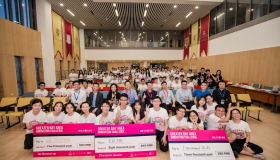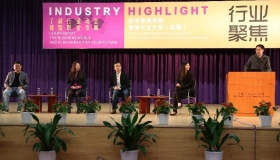CUHK (SZ) Holds 2016 MIIS International Workshop
CUHK (SZ) Holds 2016 MIIS International Workshop
To Explore Ways to Contribute to Intelligent Medicine, Communication and Urban Management
On the morning of December 18, 2016, the 2016 International Workshop on Mathematical Issues in Information Sciences (“Workshop”) was held at The Chinese University of Hong Kong, Shenzhen (“University”). In addition to the University, sponsors also include Shenzhen Research Institute of Big Data (“Institute”) and Xidian University. Professor Yangsheng Xu, President of the University, Professor Tom Luo, Director of the Institute and Vice President of the University, and Huibo Huang, Deputy District Chief of Longgang District, attended the opening ceremony.

The Institute was founded on the academic base of the University in March 2016 with the support of Shenzhen Municipal Government and Shenzhen Municipal Committee. It is intended to integrate and lead industries and research plans in relation to big data. It comprises world renowned experts in data science, including 1 Nobel Prize Laureate, 3 Academicians,, and 2 winners of the National Science Fund for Distinguished Young Scholars. The team has made significant scientific achievements in optimization theory and algorithms, machine learning, big data processing, and statistic signaling processing. At present, 35 scholars are working at the Institute and we are looking for more to join us next year.
In his opening address, Professor Yang expressed his hope: “I hope that the Institute will deepen its collaboration with world class institutes in data sharing, talent training, and technology development, and serve the city by technology commercialization, particularly make breakthroughs in precision medicine, green transportation, future communication, and smart city.”

Facilitate Development of Intelligent Medicine, Communication and Urban Management
Professor Tom Luo, leader of the Peacock Plan for Big Data Information Processing and Applications, believes that as one of China’s economic engines, Shenzhen is the best location for the Institute. He points out the three directions that big data research might follow: first, intelligent medicine, which serves precision medicine through data analysis; second, communication and network resource distribution; third, urban management, which helps the government to make sound decisions on smart city and intelligent transportation through sifting out valuable dada information.
As for intelligent medicine, the Institute has launched collaboration with Luohu Hospital, where the Institute has garnered medical data and patient records. Upon sifting out private information and algorithm analysis, we may be able to assess treatment effects, analyze patient cases, and predict the development of a disease with an accuracy rate of 90%. The Institute is developing a piece of software to help a patient to more effectively collect and analyze data for a better treatment, for instance, the software may provide information on how a treatment has worked so far and whether he or she has to return to hospital for further treatment. Meanwhile, a combined research of artificial intelligence and big data will bridge a doctor and a patient, helping the doctor to conduct a pre-diagnosis by use of artificial intelligence, in other words, the patient may learn about his or her situation on a cell phone or any other smart terminal, and the doctor will intervene only at critical moments. Consequently, the patient skips the tiresome long queue at hospital and the doctor gets some quiet moments. With artificial intelligence, doctors will be able to directly interact with patients and answer specific questions rather than repeating the same answers every day.
As for communication, the Institute has concluded an MOU with China Mobile to share data and research results. Particularly in large-network resource distribution, the Institute has also come with algorithms used on chips developed by Huawei, demonstrating a competitive edge on global market.
In addition, the Institute are collaborating with DiDi Chuxing on urban management and intelligent transportation technologies. It has also reached consensus with Longgang local government to study and use data-driven quantitative management in government decision-making process.

Explore Development Trends of Shenzhen Research Institute of Big Data
In addition to the abovementioned achievements, Professor Tom Luo, Director of the Institute, has told us that a great number of local enterprises have contacted them. A case in point is Bank of China Credit Center. It has expressed its interest in setting up a joint laboratory with the Institute to process and analyze credit card data. With the advent of big data, education, medicine, social work, and manufacturing will be more personalized and intelligent. People will be able to find the best means to move around, receive education and seek medical help thanks to big data analysis. As for development trends, Tom Luo points out that our methods for big data analysis will certainly improve with the increasing amount of big data, and more analyzing tools will be available. Real-time data analysis will gain long-due attention, artificial intelligence will be widely used in virtual assistants, robotics, intelligent advisors, and auto pilot vehicles. Recognition technology will embark on a fast tract development.
The Institute will leverage on its world class teaching staff and research capability, the first-class platform of National Supercomputing Center in Shenzhen, and potentials of an emerging research institution to develop and commercialize its big data research results, and provide the government with technical advice on medicine, education, and transportation, thereby better serving Longgang, Shenzhen and the nation as a whole.
The symposium will last three and a half days from December 17 to 20 noon. Professor Alfred Hero from the University of Michigan has been invited to present a keynote speech Continuum Limits: A Promising Frontier in Large Scale Data Analysis, and Professor David Tse from Stanford University will talk about Case Studies from DNA and RNA Assembly. In addition, Big Data at DiDi Chuxing and From K-Anonymity to Differential Privacy will also be presented at the workshop.








